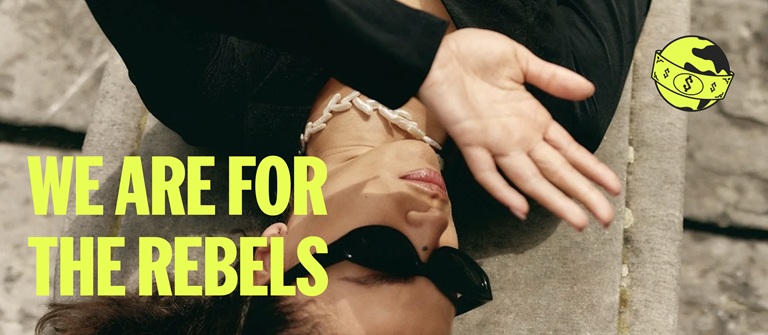The original rebels: Why founders are turning activist
)
Posted: Wed 6th Aug 2025
Today, purpose is no longer an optional add-on. But with it comes brave decisions. I question – How much of yourself do you show? How far do you go? And what happens when your values don’t align with your customers or stakeholders?
Data from 2018 showed that 76% of consumers believe brands discussing natural disasters and crises can unite people, and newer research shows activism can also boost business. Today, 40% of consumers adjust their spending based on a brand’s moral stance.
Entrepreneurs as modern activists
Small business owners are often the risk-takers and rebels. Enterprise Nation research often reveals that small businesses start to challenge the status quo. And now, more than ever, founders are turning their platforms into tools for advocacy.
Take Pippa Murray, founder of Pip&Nut. She recently took to LinkedIn to share a powerful post about the humanitarian crisis in Gaza:
“Feeding people is my business. Food brings joy. Food brings people together. But most importantly, food is vital nutrition…”
Pippa's message? A call for the food and drink industry to sign a letter urging the UK government to take urgent action.
I spoke with Ben Keene, founder of Rebel Book Club, to gain his perspective. He shared with me how Anita Roddick needed her Body Shop shampoo to stand out in Brighton’s North Laine in the late 1970s.
She also opposed animal testing, so she ensured her products weren’t tested on animals – and helped build a movement in the process.
"Activism and entrepreneurship can be natural allies. Both are hard to succeed in, so the motivation must be strong. When they align, they can pack a powerful punch. But beware of token ‘slacktivism’ – at best it’s hollow marketing, at worst pure exploitation."
Ben also brought this webinar, "Help Gaza: Create, launch and grow a community", to my attention, where six community leaders share everything they know about building thriving business communities to raise funds for families in Gaza.
Proof that even creators, individual professionals and small brands can lead on global issues.
Advocacy with a cost
That willingness to use a brand’s reach for advocacy is something Victoria Jenkins, founder of inclusive fashion brand Unhidden, knows well.
From a solo runway show at London Fashion Week to a recent collaboration with Primark, she’s reshaping the high street to make fashion more accessible for all.
Victoria also jointly chairs The Lilac Review, which recently revealed that unlocking equal opportunities for disabled founders could add £230 billion to the UK economy – yet they face stark turnover gaps and widespread barriers.
I spoke to Victoria and she said that activism comes with added weight: to be understood, she often feels pressure to share the most traumatic moments of her life.
While proud to be disabled, she resents that recognition often hinges on that label rather than her achievements as an entrepreneur.
“I look forward to the day I’m just referred to as an entrepreneur. None of us want to be othered – and we constantly are.”
For Victoria, using her voice is both a responsibility and a form of resistance in an industry where disabled representation remains scarce and too often deprioritised.
The power of intentional action
I spotted this post shared by writer and educator Giselle la Pompe‑Moore, and in a discussion, Giselle says:
“We’re living through an age of polycrisis, where calls for change are urgent but often met with division over how to act. As founders and creators, we can use our voices to share our values and spark ripples of impact – whether quiet or loud.”
For Giselle, activism works best when it’s honest, value‑led, and purpose‑driven, even if others don’t understand it.
That might mean sharing links to mutual aid funds for Palestine or Sudan, organising a community clean‑up, hosting a local event, or trusting that the work you’re doing offline is enough.
“We all carry different causes in our hearts. There’s no one way to show up – we all have different roles to play, and countless ways to express them.”
The risk of speaking up
Let’s be real: speaking up isn’t always easy. When you lead with values, not everyone will agree. Customers might question your stance. Investors might hesitate. Team members might feel unsure.
So how far do you go? Lara Sheldrake, founder of Found & Flourish says:
“Business as usual won’t cut it anymore. We’re living in a time where silence isn’t neutral and using your voice, even imperfectly, is one of the most powerful acts of leadership. Activism in business means aligning your values with your actions, even when it’s uncomfortable.
"It’s not just about visibility or profit – it’s about building something with integrity. That’s the new model. That’s what real influence looks like now.”
Lara believes brands need to choose their line and stand firm.
“It’s not about saying everything but about saying what matters most to your community. Showing up with integrity – even when it’s uncomfortable – builds trust.
"You might lose some followers, but the ones who stay? They’ll value your courage. When morality matters more than image, loyalty grows deeper."
How to humanise your brand
You don’t have to make a headline‑grabbing statement to stand for something. Start small with these five steps:
Share the reason you started your business.
Talk about what matters to you – even if it’s messy.
Champion causes that align with your values.
Give your audience ways to get involved.
Ask, "Does this reflect the kind of brand – and person – I want to be?"
Entrepreneurs are not just building businesses. They’re shaping culture. The platforms they hold, no matter how big or small, have the potential to change lives.
The real question isn’t whether you should speak up – it’s what you will say, and who you will stand with, when you do.
Get business support right to your inbox
Subscribe to our newsletter to receive business tips, learn about new funding programmes, join upcoming events, take e-learning courses, and more.
Start your business journey today
Take the first step to successfully starting and growing your business.
Join for free


